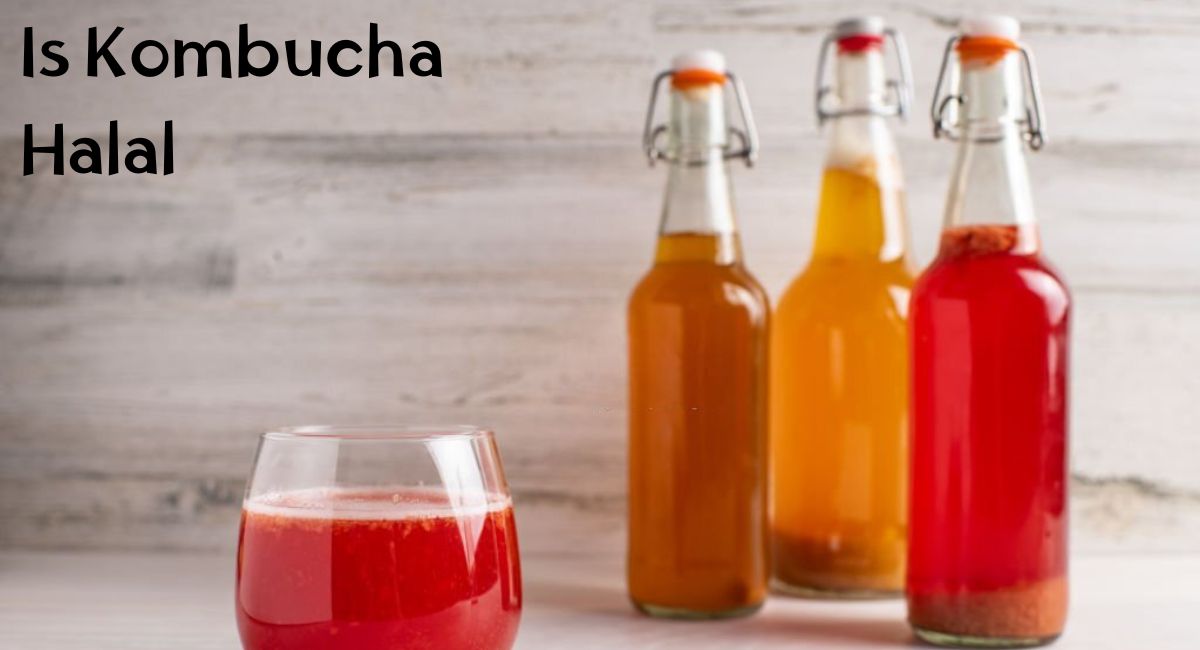In recent years, kombucha has gained immense popularity as a health-conscious and trendy beverage choice. This fermented tea-based drink is renowned for its tangy flavor and various potential health benefits, including improved digestion and immune system support. However, for individuals adhering to Islamic dietary guidelines, the question arises: Is kombucha halal?
With concerns surrounding the ingredients, fermentation process, and alcohol content, it becomes crucial to delve deeper into the halal status of kombucha.
This article aims to explore the intricacies of kombucha production, ingredients, and religious considerations, shedding light on whether this fizzy and probiotic-rich beverage aligns with the requirements of a halal diet. By addressing these concerns, we hope to provide clarity and understanding for those seeking to make informed choices regarding their consumption of kombucha within the context of Islamic dietary practices.
Is Kombucha Halal
Kombucha is generally considered halal for consumption by Muslims despite containing trace amounts of alcohol resulting from the fermentation process.
The amount of alcohol in kombucha tea is very low, typically less than 0.5%, which is similar to the alcohol content found in other fermented foods like ripe bananas, yogurt, grape juice, bread, pickles, and vinegar. Since the trace amounts of alcohol in kombucha are naturally occurring due to fermentation and do not lead to drunkenness, drinking kombucha is not considered haram in Islam.
However, it is important to note that flavored kombucha may have additional ingredients used for flavoring, and these ingredients should be carefully considered for their halal status. Flavored kombucha may contain flavorings that are not halal or may have been processed in facilities that handle haram ingredients. It is recommended to check the ingredients list or contact the manufacturer to ensure the ingredients used in flavored kombucha are halal.
Given the varying opinions, it is advisable to consult a knowledgeable Islamic scholar or certification authority for specific guidance on the halal status of kombucha and its flavors, as the halal status can depend on the ingredients and production processes used.
Is Remedy Kombucha Halal
Remedy Kombucha is a brand that produces a variety of delicious and healthy drinks. They specialize in making no-sugar, low-calorie, live cultured, and organic beverages, including their flagship product, Remedy Kombucha. Unlike traditional kombucha, Remedy Kombucha is made without sugar and alcohol, making it a lighter and refreshing option.
All flavors of Remedy Kombucha, Remedy Sparkling Apple Cider Vinegar, and Remedy Energy are certified Halal by the Al-Iman Islamic Society Inc. This certification ensures that these products meet the requirements and standards for Halal consumption.
It is important to note that the halal certification of these specific Remedy products has been verified by the Al-Iman Islamic Society Inc. However, it is always recommended to check for the Halal logo or certification mark on the packaging of the products to ensure their compliance with Halal standards.
Is Teazen Kombucha Halal
Teazen Kombucha Tea is one of the products offered by Teazen, a company that specializes in providing various types of teas and related products. It offers several flavors of Kombucha Tea, including Kombucha Lemon, Kombucha Berry, Kombucha Yuzu, and Kombucha Peach. Each flavor may have its unique taste profile and characteristics.
While Teazen Kombucha is not halal certified, our ingredient analysis showed that none of the variants contain any haram ingredients. Therefore, based on this information, we can consider Teazen Kombucha as halal.
Is Synergy Raw Kombucha Halal
SYNERGY Raw Kombucha is a product offered by GT’s Living Foods. It is described as an authentic, raw kombucha that promotes better health. The kombucha is fully fermented for 30 days in small batches, resulting in a probiotic-rich beverage. It claims to have 18 times more probiotics than the next leading competitor. The kombucha is brewed with kiwi juice, which helps cultivate 9 billion living probiotics per bottle.
GT’s Living Foods emphasizes the use of clean, pure, and organic ingredients in their kombucha. They believe in traditional brewing methods and use small, five-gallon batches for fermentation. Each batch is linked to their original Himalayan Mother SCOBY (Symbiotic Culture Of Bacteria and Yeast), which is responsible for the fermentation process and the creation of beneficial nutrients in the kombucha.
While Synergy Raw Kombucha is not halal certified, our ingredient analysis showed that none of the variants contain any haram ingredients. Therefore, based on this information, we can consider Synergy Raw Kombucha as halal.
However, it is important to note that the halal status of a product goes beyond just the individual ingredients. It also depends on the production process, potential cross-contamination, and adherence to halal certification standards.
To determine the halal status of Synergy Raw Kombucha, it is recommended to look for official halal certification from reputable halal certification authorities or consult with a knowledgeable Islamic scholar. These authorities and scholars can provide specific guidance based on the production process and overall compliance with halal requirements.
What is Kombucha
Kombucha is a fermented tea beverage that has gained popularity in recent years due to its potential health benefits and unique flavor. It is made through the fermentation of sweetened tea by a symbiotic culture of bacteria and yeast (SCOBY). The SCOBY consumes the sugar in the tea and produces various compounds, including organic acids, vitamins, and trace amounts of alcohol, resulting in a tangy and effervescent drink.
The exact origins of kombucha are uncertain, and different theories exist regarding its history. One theory suggests that kombucha originated in Northeast China over 2,000 years ago and was known as the “Tea of Immortality”. Other records indicate that kombucha has been used in Eastern Europe, Russia, and Japan for centuries.
The fermentation process involved in making kombucha has long been used as a method of food preservation and was likely discovered through trial and error. Over time, different cultures and regions adopted their own variations of fermented tea drinks, leading to the development of kombucha as we know it today.
In recent decades, kombucha has experienced a surge in popularity, with commercial brands offering a wide range of flavors and varieties. It has gained a reputation for being a probiotic-rich beverage that may support gut health and provide antioxidant properties. However, it is important to note that scientific research on the health benefits of kombucha is still ongoing.
What Kind of Tea is Kombucha

While kombucha can be made using different types of tea, the most commonly used tea for making kombucha is black tea.
Black tea, along with green tea, white tea, oolong tea, and pu-erh tea, all come from the Camellia sinensis plant and are considered “real” tea. These teas are produced by processing the leaves of the Camellia sinensis plant in different ways, resulting in various flavors and characteristics.
The choice of tea used in kombucha production can impact the flavor profile of the final product. Black tea, in particular, is commonly used due to its robust flavor and ability to provide the necessary nutrients for the fermentation process. Green tea can also be used for a milder kombucha flavor.
It’s worth noting that while tea is an essential component of kombucha, the final product undergoes fermentation, which transforms the tea and sugar into a tangy and effervescent beverage with potential health benefits.
Types of Kombucha
Kombucha is a versatile beverage, and there are various types and flavors available to cater to different preferences. Here are some common types of kombucha:
- Traditional Kombucha: This is the classic version of kombucha made from black or green tea, sugar, and the kombucha culture (SCOBY). It has a tangy, slightly sour flavor with a hint of sweetness. Traditional kombucha forms the base for many flavored variations.
- Fruit Flavored Kombucha: Many kombucha brands offer fruit-flavored varieties by adding fruit juices or purees during the fermentation process. Common fruit flavors include strawberry, raspberry, blueberry, mango, and peach. These flavors add a fruity sweetness to the kombucha.
- Herbal Kombucha: Herbal kombucha is made by infusing the kombucha base with herbs and botanicals. It can include flavors like ginger, lavender, hibiscus, mint, and chamomile. Herbal kombucha offers unique and refreshing taste profiles.
- Floral Kombucha: Floral kombucha incorporates floral flavors and aromas into the brew. Popular floral additions include rose petals, jasmine, elderflower, and lavender. These kombucha varieties often have a delicate and fragrant taste.
- Spiced Kombucha: Spiced kombucha incorporates spices and herbs like cinnamon, cardamom, clove, and nutmeg. These flavors provide warmth and depth to the kombucha, creating a cozy and aromatic experience.
- Seasonal or Limited Edition Kombucha: Some kombucha brands release seasonal or limited edition flavors that reflect the flavors of a particular season or occasion. These can include flavors like pumpkin spice in the fall or cranberry during the holiday season.
It’s important to note that the availability of specific kombucha flavors may vary depending on the brand and region. Additionally, some individuals may choose to brew their own kombucha at home, allowing for even more experimentation with flavors and ingredients.
When choosing kombucha, it’s recommended to check the ingredients and nutritional information to ensure it aligns with your preferences and dietary needs. Keep in mind that the taste and quality of kombucha can vary between brands, so it’s worth exploring different options to find your favorite.
Kombucha Ingredients

Kombucha is made using a few key ingredients that undergo a fermentation process. Here are the main ingredients involved in making kombucha:
- Tea: The base of kombucha is typically black or green tea. Tea provides the necessary nutrients and compounds for the fermentation process. Black tea is commonly used for its robust flavor, while green tea offers a lighter taste. Some kombucha variations may use other types of tea, such as oolong or white tea, to create different flavor profiles.
- Sugar: Kombucha fermentation requires sugar as a food source for the culture of bacteria and yeast. The sugar is consumed during the fermentation process, and the resulting kombucha has a lower sugar content compared to the initial mixture. The sugar also contributes to the carbonation and flavor development of the final product.
- Starter Tea: Starter tea is kombucha from a previous batch that contains live cultures. It serves as a liquid starter and introduces beneficial bacteria and yeast to kickstart the fermentation process. If you don’t have starter tea, you can use store-bought unpasteurized kombucha as a substitute.
- SCOBY: SCOBY stands for Symbiotic Culture of Bacteria and Yeast. It is the living culture responsible for fermenting the tea and transforming it into kombucha. The SCOBY is a gelatinous disk-like structure composed of a cellulose pellicle that floats on top of the fermenting liquid. It contains a combination of bacteria and yeast that work together to convert the sugar and tea into beneficial compounds.
- Water: Water is the primary liquid used to brew kombucha. It should be filtered or free from contaminants to create a suitable environment for the fermentation process.
- Flavorings (optional): After the initial fermentation, kombucha can be flavored during a secondary fermentation. This involves adding additional ingredients like fruits, herbs, spices, or juices to enhance the flavor and create unique variations. Common flavorings include ginger, lemon, berries, and herbs.
How is Kombucha Made
Kombucha is a fermented tea beverage that is made through a simple process involving several key steps. Here is a comprehensive guide on how kombucha is made:
- Making the tea base: The process begins by brewing a pot of tea using black or green tea leaves. The tea leaves are steeped in hot water, and sugar is added to provide nutrients for the fermentation process. The sweetened tea mixture is then cooled to room temperature.
- Adding a SCOBY: SCOBY, which stands for Symbiotic Culture of Bacteria and Yeast, is a gelatinous disk-like structure that contains a combination of beneficial bacteria and yeast. The SCOBY is added to the cooled tea mixture. It acts as the starter culture and initiates the fermentation process.
- Fermentation: The tea mixture with the SCOBY is transferred to a fermentation vessel, such as a glass jar. The vessel is covered with a breathable cloth or paper towel to allow air circulation while preventing contaminants from entering. The fermentation takes place at room temperature, typically between 68-85°F (20-29°C). During fermentation, the bacteria and yeast in the SCOBY consume the sugar and convert it into various beneficial compounds, including organic acids and carbon dioxide. This process can take anywhere from 7 to 14 days, depending on factors such as temperature and desired flavor.
- Monitoring the fermentation: Throughout the fermentation process, it is important to monitor the kombucha for signs of progress. The liquid may undergo visual changes, such as forming a new layer on top called a “baby SCOBY” or developing bubbles and sediment. Taste tests can be conducted periodically to check the flavor development and acidity level. It’s crucial to maintain proper hygiene practices during this stage to prevent contamination.
- Harvesting the kombucha: Once the desired flavor profile is achieved, the kombucha is ready to be harvested. A portion of the liquid can be carefully drawn off from the vessel, leaving behind the SCOBY and a small amount of liquid as a starter for the next batch. The harvested kombucha can be consumed as is or undergo further steps for carbonation and flavor enhancement.
- Optional steps: Secondary fermentation and flavoring: After the first fermentation, some brewers choose to perform a secondary fermentation. This involves transferring the harvested kombucha into sealed bottles, adding additional flavorings like fruit juice or herbs, and allowing it to ferment for a shorter period, typically 1 to 3 days. This step helps to create natural carbonation in the kombucha. It’s essential to release built-up pressure from the bottles periodically to prevent explosions.
- Refrigeration and storage: Once the desired level of carbonation is achieved during the secondary fermentation, the kombucha can be refrigerated to slow down the fermentation process and enhance its shelf life. Refrigerated kombucha can typically be stored for several weeks, although the flavor may continue to develop over time.
Health Benefits of Kombucha
Kombucha is known for its potential health benefits. While further research is needed to fully understand its effects, here are some of the reported health benefits of kombucha:
- Gut Health: Kombucha contains beneficial probiotics that can support a healthy gut microbiome. Probiotics are live microorganisms that can enhance digestion and promote a balanced gut environment.
- Antioxidants: Kombucha is rich in antioxidants, which help protect the body against oxidative stress and potential cell damage. Antioxidants play a crucial role in neutralizing harmful free radicals and reducing inflammation in the body.
- Potential Immune Support: Some studies suggest that kombucha’s probiotics and antioxidants may help support a healthy immune system. However, more research is needed to fully understand the extent of its immune-related benefits.
- Digestive Health: Kombucha has been associated with potential digestive benefits, such as improving digestion and relieving constipation. The presence of probiotics in kombucha may contribute to these effects.
- Disease Prevention: Some early studies suggest that kombucha’s antioxidants and bioactive compounds may have anticancer, antidiabetic, and antimicrobial properties. However, further research is necessary to confirm these potential benefits.
- Metabolism Support: Certain types of kombucha made from green tea may contain compounds like epigallocatechin gallate (EGCG), which is associated with a slightly faster metabolism. However, more research is needed to fully understand the effects of kombucha on metabolism.
Potential Side Effects of Kombucha
While kombucha offers potential health benefits, it’s important to be aware of possible side effects associated with its consumption. Here are some reported potential side effects of kombucha:
- Digestive Issues: Consuming excessive amounts of kombucha or drinking it improperly can lead to digestive discomfort, such as stomach upset or bloating.
- High Calorie and Sugar Content: Some kombucha products can be high in calories, with up to 120 calories per bottle. Excessive consumption of high-calorie kombucha can contribute to weight gain.
- Caffeine Content: Kombucha can contain small amounts of caffeine due to the tea used in its fermentation process. For individuals sensitive to caffeine or those who consume large quantities of kombucha, it can lead to sleep disturbances or other caffeine-related effects.
- Potential for Contamination: There is a risk of contamination or over-fermentation when making or consuming kombucha improperly. Contamination can lead to the growth of harmful bacteria or molds, which may cause illness.
- Allergic Reactions: Some individuals may be allergic to certain components of kombucha, such as tea or the microorganisms present in the drink. Allergic reactions can manifest as skin rashes, itching, or respiratory symptoms.
How to Drink Kombucha Safely

To drink kombucha safely, consider the following guidelines:
- Start Slowly: If you’re new to kombucha, start by consuming small amounts and observe how your body reacts. This will help you determine your tolerance and sensitivity to the beverage.
- Moderate Consumption: It’s generally recommended to limit your kombucha intake to one bottle per day. Excessive consumption of kombucha may lead to undesired side effects.
- Choose Quality Products: When selecting kombucha, look for reputable brands that prioritize safety, quality ingredients, and adherence to industry standards. Ensure the product is properly sealed and within its expiration date.
- Avoid Over-Fermented or Contaminated Kombucha: Over-fermentation can result in higher alcohol content or the growth of harmful bacteria. Check for signs of excessive carbonation or unusual odor, and discard any kombucha that appears moldy, slimy, or spoiled.
- Store Properly: To maintain the quality and safety of kombucha, store it in a cool environment, ideally in the refrigerator. Proper storage helps prevent excessive fermentation and maintains the beverage’s freshness.
- Consider Personal Health Factors: If you have pre-existing health conditions, are pregnant or breastfeeding, or take medications, consult with a healthcare professional before incorporating kombucha into your diet to ensure its suitability for your specific circumstances.
To further expand your understanding of caffeine-based beverages, explore our comprehensive guides on the halal status of various caffeinated drinks. Make informed choices that align with your dietary preferences and beliefs.
Is Bubble Tea Haram: Dive into the world of bubble tea and its halal status in this article. Learn about the ingredients and preparation methods to ensure you can enjoy this trendy beverage while adhering to your dietary preferences.
Is Caffeine Haram: Uncover the truth about caffeine’s halal status in this informative piece. Explore the different sources of caffeine and understand how they align with your halal dietary choices.
Is Coffee Halal or Haram: Brew up your knowledge about the halal status of coffee with this article. Learn about the various aspects of coffee production and consumption and how they relate to Islamic dietary guidelines.
Is Tea Halal or Haram: Sip on the details of tea’s halal status in this engaging read. Explore the diverse world of tea varieties and find out how they fit into your halal lifestyle.
Frequently Asked Questions
1. Is kvass halal?
Kvass is generally considered halal. It is a non-alcoholic beverage with 0.05% to 1.0% ABV. It is made from various ingredients such as stale sourdough rye bread, beets, fruit, honey, and herbs. It can also be flavored with spices, herbs, and fruit such as coriander, caraway, lemon verbena, mint, apples, pears, and berries.
2. Is kefir halal?
Kefir is generally considered halal. The small amounts of alcohol naturally produced during the fermentation process in kefir are considered permissible in Islamic dietary laws. However, it is recommended to ensure that the kefir is free from any haram (prohibited) ingredients and contamination. Consulting with a halal certification authority can provide further clarity on specific brands or products.
3. Can you get drunk off kombucha?
It is highly unlikely to get drunk off commercially available kombucha. Although kombucha is a fermented drink, the alcohol content is typically kept below 0.5% by most manufacturers to meet non-alcoholic regulations. The trace amounts of alcohol in kombucha are generally insufficient to cause intoxication. However, homemade kombucha or specially brewed varieties may contain higher alcohol levels, so it is essential to check the alcohol content before consumption.
4. Is it illegal to drink kombucha under 21?
In most countries, including the United States, it is legal to drink kombucha under the age of 21. Since the alcohol content in commercially available kombucha is typically below 0.5%, it is classified as a non-alcoholic beverage. However, it is advisable to check local regulations as they may vary.
5. Is kombucha vegan?
Kombucha is generally considered vegan-friendly. It is made from fermented tea, sugar, and a symbiotic culture of bacteria and yeast (SCOBY). As long as no animal-derived ingredients are added during the brewing process, kombucha remains vegan. However, it’s always recommended to check the ingredients or consult with the manufacturer to ensure no animal products or by-products are used.
6. What does kombucha taste like?
The taste of kombucha can vary depending on the specific brand and flavor. Generally, kombucha has a tangy, slightly acidic, and slightly sweet taste. It may have effervescence similar to carbonated drinks and can be flavored with various fruits, herbs, or spices. Some people describe the flavor profile of kombucha as similar to a fizzy, fermented tea.








